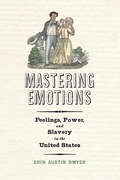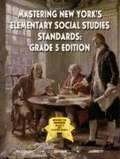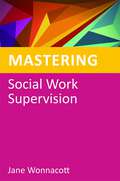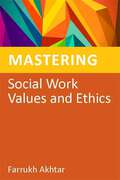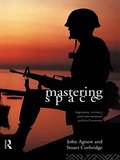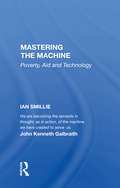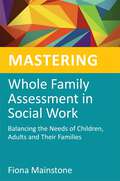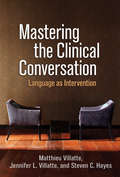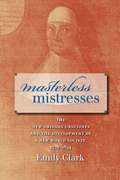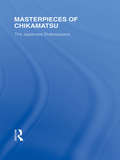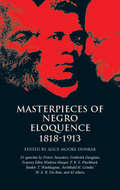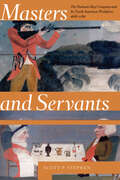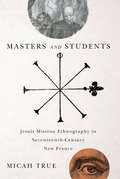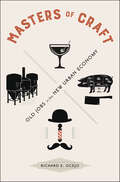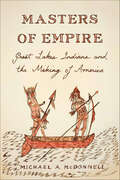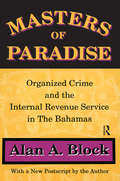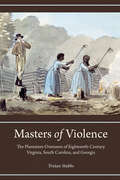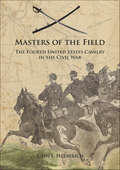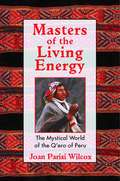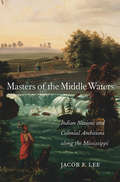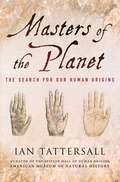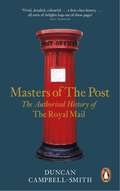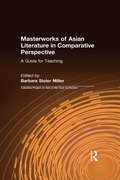- Table View
- List View
Mastering Emotions: Feelings, Power, and Slavery in the United States (America in the Nineteenth Century)
by Erin Austin DwyerEmotions were central to the ways that slaveholders perpetuated slavery, as well as to the ways that enslaved people survived and challenged bondage and experienced freedom. Mastering Emotions examines the interactions between slaveholders and enslaved people, and between White people and free Black people, to expose how emotions such as love, terror, happiness, and trust functioned as social and economic capital for slaveholders and enslaved people alike.The daily interactions that occurred between slaveholders and enslaved people around emotions, in conjunction with larger debates about race and freedom, form the backbone of what Erin Austin Dwyer calls the emotional politics of slavery. Race and status determined which emotions were permissible or punishable, which should be restrained, and by whom. As a result, mastering emotions, one's ability to control one's own feelings and those of others, was paramount for slaveholders and enslaved. The emotional politics of slavery were thus fashioned by enslaved people and slaveholders together through the crucible of slavery.Emancipation was a seismic shift in the affective landscape of the antebellum South. Though the end of the Civil War rendered moot the debate over how to emotionally maintain slavery, the lingering conflict over whether the emotional strictures governing the South would be based on race or free status had serious repercussions, particularly for free Black people. The postwar rise of legal and extralegal attempts to affectively control free Black people underscored the commitment of elite White Southerners to preserving the power dynamics of the emotional politics of slavery, by any means necessary. Mastering Emotions concludes by detailing how the long-term legacy of those emotional politics reverberated through Reconstruction and the Jim Crow eras.
Mastering New York's Elementary Social Studies Standards (Grade 5 Edition)
by Mark JarrettSocial studies textbook for New York 5th graders.
Mastering Ohio's Grade 6 Social Studies Test
by James Killoran Stuart Zimmer Mark JarrettThe book is arranged by units, covering all four tested strands — history, geography, government, and economics — that will be tested. <p><p> ★ Highly focused content summaries in each chapter provide the most essential information your students need to know for each Content Statement. <p> ★ All of the fundamental social studies skills required by the new curriculum are presented in this book. <p> ★ For each strand, a unit pre-test allows you to see what your students already know. A unit test then allows you to assess what your students have learned by the end of the unit. <p> ★ Every page in the book is perforated, allowing students to easily remove pages to hand in or to exchange with other students in class. <p> ★ The book is based on the principles of the National Research Council’s How People Learn, the methodologies of Robert Marzano’s Classroom Instruction that Works, and the strategies for teaching content-area literacy in Janet Allen’s Tools for Teaching Content Literacy. In short, every chapter is designed to help your students perform their very best on the test.
Mastering Social Work Values and Ethics
by Hilary Tompsett Farrukh AkhtarService users often say that the traits they most value in social workers are their ability to be non-judgmental, their listening skills and their sense of fairness: their strong ethical value base. But how can social workers ensure the decisions they make are ethically sound? This book offers guidelines to negotiating ethical dilemmas in various social work settings; from direct care work with individual service users to working within organisational and multidisciplinary contexts. It provides social workers with useful frameworks within which to re-visit their personal value base and enable more reflective, and therefore more effective, practice. Case studies and questionnaire style chapters encourage reassessment of values including views on abortion, female genital mutilation, drug and alcohol misuse and homosexuality. By assessing a range of dilemmas at both personal and organisational levels, this book offers the tools and resources to enable professionals and students to self-manage and develop their practice. This book is essential reading for social work students, practitioners, managers, practice teachers and assessors, and trainers, as well as those in allied professions.
Mastering Space: Hegemony, Territory and International Political Economy
by John Agnew Stuart CrobridgeFor over two hundred years the domination of some countries by others has been intrinsic to international relations, with national economic and political strength viewed as essential to a nation's survival and global position. Mastering Space identifies the essential features of this "state-centredness" and suggests an optimistic alternative more in keeping with the contemporary post-Cold War climate. Drawing on recent geopolitical thinking, the authors claim that the dynamism of the international political economy has been obscured through excessive attention on the state as an unchanging actor. Dealing with such topical issues as Japan's rise to economic dominance and America's perceived decline, as well as the global impact of continued geographical change, the book discusses the role of geographical organization in the global political economy, and the impact of increasing economic globalisation and political fragmentation in future international relations. The authors identify the present time as crucial to the global political economy, and explore the possibilities of moving the world from mastering space to real reciprocity between peoples and places. John Agnew is a Professor of Geography at the Maxwell School of Citizenship and Public Affairs, Syracuse University. Stuart Corbridge is a lecturer in Geography at the University of Cambridge and a Fellow of Sidney Sussex College.
Mastering The Machine: Poverty, Aid And Technology
by Ian Smillie'Mastering the Machine Revisited' is about the connection between poverty, aid and technology. It is about a search that has been going on, officially in the developing world for over forty years, and less officially in most countries since the beginning of time. It is a search driven today by more hard core poverty than has ever been known, and by
Mastering the Clinical Conversation
by Steven C. Hayes Matthieu Villatte Jennifer L. VillatteThis compelling book provides psychotherapists with evidence-based strategies for harnessing the power of language to free clients from life-constricting patterns and promote psychological flourishing. Grounded in relational frame theory (RFT), the volume shares innovative ways to enhance assessment and intervention using specific kinds of clinical conversations. Techniques are demonstrated for activating and shaping behavior change, building a flexible sense of self, fostering meaning and motivation, creating powerful experiential metaphors, and strengthening the therapeutic relationship. User-friendly features include more than 80 clinical vignettes with commentary by the authors, plus a "Quick Guide to Using RFT in Psychotherapy" filled with sample phrases and questions to ask.
Masterless Mistresses
by Emily ClarkDuring French colonial rule in Louisiana, nuns from the French Company of Saint Ursula came to New Orleans, where they educated women and girls of European, Indian, and African descent, enslaved and free, in literacy, numeracy, and the Catholic faith. Although religious women had gained acceptance and authority in seventeenth-century France, the New World was less welcoming. Emily Clark explores the transformations required of the Ursulines as their distinctive female piety collided with slave society, Spanish colonial rule, and Protestant hostility.The Ursulines gained prominence in New Orleans through the social services they provided--schooling, an orphanage, and refuge for abused and widowed women--which also allowed them a self-sustaining level of corporate wealth. Clark traces the conflicts the Ursulines encountered through Spanish colonial rule (1767-1803) and after the Louisiana Purchase, as Protestants poured into Louisiana and were dismayed to find a powerful community of self-supporting women and a church congregation dominated by African Americans. The unmarried nuns contravened both the patriarchal order of the slaveholding American South and the Protestant construction of femininity that supported it. By incorporating their story into the history of early America, Masterless Mistresses exposes the limits of the republican model of national unity.
Masterpieces of Chikamatsu: The Japanese Shakespeare (Routledge Library Editions: Japan)
by Robert NicholsThis is a selection of the best plays of Chikamatsu, one of the greatest Japanese dramatists. Master of the marionette and popular dramas, he had, until the publication of this book, remained unknown to western readers owing to the difficulty of translating the work into English. The introduction provides a comprehensive survey of the history of Japanese drama which will assist the reader in better understanding the plays.
Masterpieces of Negro Eloquence: 1818-1913 (African American)
by Alice Moore Dunbar51 speeches by prominent African-American leaders include Booker T. Washington's "Atlanta Compromise" address, Frederick Douglass' "What to the Slave Is the Fourth of July?", plus speeches by W. E. B. Du Bois, Fanny Jackson, Rev. W. J. Gaines, and many others.
Masters and Servants: The Hudson's Bay Company and Its North American Workforce, 1668–1786
by Scott P. Stephen“[Stephen] offers fresh insight into the path a historic fur trading business took to become one of Canada’s most recognizable retailers.” —Literary Review of CanadaIn Masters and Servants, Scott P. Stephen reveals startling truths about Hudson’s Bay Company (HBC) workers. Rather than dedicating themselves body and soul to the Company’s interests, these men were hired like domestic servants, joining a “household” with its attendant norms of duty and loyalty. The household system produced a remarkably stable political-economic entity, connecting early North American resource extraction to larger trends in British imperialism. Through painstaking research, Stephen shines welcome light on the lives of these largely overlooked individuals. An essential book for labor historians, Masters and Servants will appeal to scholars of early modern Britain, the North American fur trade, Western social history, business history, and anyone intrigued by the reach of the HBC.“Blacksmiths, bookkeepers, loggers, tanners, coopers, cooks, sail-makers, interpreters, surveyors, clergy, the list goes on as Stephen marches us through the lives of the early Hudson’s Bay worker.” —The Ormsby Review“Overall, the book reflects the work of a historian comfortable with the hard work of archival research and with an eye for detail and insightful quotations. In many respects, it does for Hudson’s Bay Company employees what Carolyn Podruchny’s Making the Voyageur World did for employees of the Montreal-based fur trade companies in recreating their values, worldview, and distinctive work environment.” —Michael Payne, Prairie History
Masters and Students: Jesuit Mission Ethnography in Seventeenth-Century New France
by Micah TrueThe word "mission" can suggest a distant and dangerous attempt to obtain information for the benefit of the home left behind. However, the term also applies to the movement of information in the opposite direction, as the primary motivation of those on religious missions is not to learn about another culture, but rather to teach their own particular worldview. In Masters and Students, Micah True considers the famous Jesuit Relations (1632-73) from New France as the product of two simultaneous missions, in which the Jesuit priests both extracted information from the poorly understood inhabitants of New France and attempted to deliver Europe's religious knowledge to potential Amerindian converts. This dual position of student and master provides the framework for the author’s reflection on the nature of the Jesuits’ "facts" about Amerindian languages, customs, and beliefs that are recorded in the Relations. Following the missionaries through the process of gaining access to New France, interacting with Amerindian groups, and communicating with Europe about the results of their efforts, Masters and Students explores how the Relations were shaped by the distinct nature of the Jesuit approach to their mission - in both senses of the word.
Masters of Craft: Old Jobs in the New Urban Economy
by Richard E. OcejoHow educated and culturally savvy young people are transforming traditionally low-status manual labor jobs into elite taste-making occupationsIn today’s new economy—in which “good” jobs are typically knowledge or technology based—many well-educated and culturally savvy young men are instead choosing to pursue traditionally low-status manual labor occupations as careers. Masters of Craft looks at the renaissance of four such trades: bartending, distilling, barbering, and butchering.In this in-depth and engaging book, Richard Ocejo takes you into the lives and workplaces of these people to examine how they are transforming these once-undesirable jobs into “cool” and highly specialized upscale occupational niches—and in the process complicating our notions about upward and downward mobility through work. He shows how they find meaning in these jobs by enacting a set of “cultural repertoires,” which include technical skills based on a renewed sense of craft and craftsmanship and an ability to understand and communicate that knowledge to others, resulting in a new form of elite taste-making. Ocejo describes the paths people take to these jobs, how they learn their chosen trades, how they imbue their work practices with craftsmanship, and how they teach a sense of taste to their consumers.Focusing on cocktail bartenders, craft distillers, upscale men’s barbers, and whole-animal butcher shop workers in Manhattan, Brooklyn, and upstate New York, Masters of Craft provides new insights into the stratification of taste, gentrification, and the evolving labor market in today’s postindustrial city.
Masters of Empire: Great Lakes Indians and the Making of America
by Michael A. McDonnellA radical reinterpretation of early American history from a native point of viewIn Masters of Empire, the historian Michael McDonnell reveals the pivotal role played by the native peoples of the Great Lakes in the history of North America. Though less well known than the Iroquois or Sioux, the Anishinaabeg who lived along Lakes Michigan and Huron were equally influential. McDonnell charts their story, and argues that the Anishinaabeg have been relegated to the edges of history for too long. Through remarkable research into 19th-century Anishinaabeg-authored chronicles, McDonnell highlights the long-standing rivalries and relationships among the great tribes of North America, and how Europeans often played only a minor role in their stories. McDonnell reminds us that it was native people who possessed intricate and far-reaching networks of trade and kinship, of which the French and British knew little. And as empire encroached upon their domain, the Anishinaabeg were often the ones doing the exploiting. By dictating terms at trading posts and frontier forts, they played a crucial role in the making of early America. Through vivid depictions of early conflicts, the French and Indian War, and Pontiac's Rebellion, all from a native perspective, Masters of Empire overturns our assumptions about colonial America and the origins of the Revolutionary War. By calling attention to the Great Lakes as a crucible of culture and conflict, McDonnell reimagines the landscape of American history.
Masters of Paradise: Organised Crime and the Internal Revenue Service in the Bahamas
by Alan A. BlockThis is the story of organized crime's penetration of the islands and the corruption of its high officials during the time The Bahamas become politically independent of Great Britain. It describes secret U.S. Internal Revenue Service operations aimed at American criminals involved in Bahamian-based tax scams and similar crimes. Block paints a devastating picture of a symbiotic relationship among off-shore tax havens in The Bahamas, sophisticated American criminals, and complacent public officials in the United States.During the 1960s and 1970s, the I.R.S. launched major investigations into American organized crime and the subterranean economy of The Bahamas. Block's access to the private papers of many of the key players in these affairs has given him a unique perspective. He has uncovered details of crime, corruption, and bureaucratic infighting within and among the U.S. Treasury and Justice Departments that have been largely unrecognized by previous researchers.Block shows how important links in the international traffic in cocaine were forged in the Bahamas, in full view of American officials. Masters of Paradise raises major questions about American law enforcement officials' commitment to fighting complex international crime during the 1960s and the 1970s.While there have been other studies of tax havens, money laundering, and offshore investigations, Block's access to information and his grasp of its meaning is unique. Professionals interested in the history and sociology of organized crime and the underground economy will find this book eye-opening. General readers interested in organized crime and political corruption will find it absorbing.
Masters of Violence: The Plantation Overseers of Eighteenth-Century Virginia, South Carolina, and Georgia (Carolina Lowcountry and the Atlantic World)
by Tristan StubbsFrom trusted to tainted, an examination of the shifting perceived reputation of overseers of enslaved people during the eighteenth century.In the antebellum southern United States, major landowners typically hired overseers to manage their plantations. In addition to cultivating crops, managing slaves, and dispensing punishment, overseers were expected to maximize profits through increased productivity—often achieved through violence and cruelty. In Masters of Violence, Tristan Stubbs offers the first book-length examination of the overseers—from recruitment and dismissal to their relationships with landowners and enslaved people, as well as their changing reputations, which devolved from reliable to untrustworthy and incompetent.At the beginning of the eighteenth century, slave owners regarded overseers as reliable enforcers of authority; by the end of the century, particularly after the American Revolution, plantation owners viewed them as incompetent and morally degenerate, as well as a threat to their power. Through a careful reading of plantation records, diaries, contemporary newspaper articles, and many other sources, Stubbs uncovers the ideological shift responsible for tarnishing overseers’ reputations.In this book, Stubbs argues that this shift in opinion grew out of far-reaching ideological and structural transformations to slave societies in Virginia, South Carolina, and Georgia throughout the Revolutionary era. Seeking to portray slavery as positive and yet simultaneously distance themselves from it, plantation owners blamed overseers as incompetent managers and vilified them as violent brutalizers of enslaved people.“A solid work of scholarship, and even specialists in the field of colonial slavery will derive considerable benefit from reading it.” —Journal of Southern History“A major achievement, restoring the issue of class to societies riven by racial conflict.” —Trevor Burnard, University of Melbourne“Based on a detailed reading of overseers’ letters and diaries, plantation journals, employer’s letters, and newspapers, Tristan Stubbs has traced the evolution of the position of the overseer from the colonial planter’s partner to his most despised employee. This deeply researched volume helps to reframe our understanding of class in the colonial and antebellum South.” —Tim Lockley, University of Warwick
Masters of the Field: The Fourth United States Cavalry in the Civil War
by John L. HerberichThe only regular U.S. Cavalry regiment from the Western Theater to fight in the Civil War
Masters of the Living Energy: The Mystical World of the Q'ero of Peru
by Joan Parisi WilcoxAn intimate glimpse into the world of ancient Peruvian spiritual practice and cosmology• Reveals the mysteries of the world of living energy (kawsay pacha) through intensive in-depth interviews with six Q’ero mystics• Explores the energetics, spirits, tools, and practices of Andean mysticism--the real story behind the fictionalized accounts in The Celestine Prophecy Known as the “keepers of the ancient knowledge,” the Q’ero Indians of Peru are the most respected mystics of the south-central Andes. In 1996 Joan Parisi Wilcox traveled to the Andes and was able to record the mysteries of kawsay pacha, the multidimensional world of living energy, through more than 40 hours of intensive interviews with six Q’ero paqos, masters of the ancient spiritual traditions of Peru. The Q’ero are known for having preserved the Inca spiritual tradition more purely than any other indigenous population in the Andes. The in-depth interviews presented in this book recount the direct words of these masters so readers can discover for themselves the mind and heart space of these people. Four new chapters of this revised edition focus on the work of the mesa, the Andean form of a spiritual medicine bundle, and its use as a conduit for the healing energies of nature. The mesa is called the “heart’s fire” because it represents the finest energy--the energy of compassion--that a paqo cultivates while walking the sacred path. Wilcox provides instructions on how to make, activate, and work with a mesa, as well as other practical exercises showing how we can use the power of the Andean spiritual tradition in our own lives.
Masters of the Middle Waters: Indian Nations and Colonial Ambitions along the Mississippi
by Jacob F. LeeJacob Lee offers a new understanding of the conquest of the American West based on the long history of warfare and resistance in the Mississippi River valley. The river and its tributaries were never simply a backdrop to unfolding events but advanced and thwarted the aspirations of Native nations, European imperialists, and American settlers alike.
Masters of the Planet: The Search for Our Human Origins
by Ian TattersallIan Tattersall takes us deep into the fossil record to uncover what made humans so special. Surveying a vast field from initial bipedality to language and intelligence, Tattersall argues that Homo sapiens acquired a winning combination of traits that was not the result of long term evolutionary refinement. Instead it emerged quickly, shocking their world and changing it forever.
Masters of the Post: The Authorized History of the Royal Mail
by Duncan Campbell-SmithThe origins of the Post Office go back to the early years of the Tudor monarchy: Brian Tuke, a former King's Bailiff in Sandwich, was acknowledged as the first 'Master of the Posts' by Cardinal Wolsey in 1512, and went on to build up a network of 'postmasters' across England for Henry VIII. Over the following five hundred years the Royal Mail expanded to an unimaginable degree to become the largest employer in the country, and the face of the British state for most people in their everyday lives. But it also faced the demands of an increasingly commercial marketplace. With the election of Margaret Thatcher in 1979, the possibility of privatising the Royal Mail has prompted passionate arguments - and has added immeasurably to the difficulties of running it. In charting the whole of this extraordinary story, Duncan Campbell-Smith recounts a series of remarkable tales, including how postal engineers built the first programmable computer for the wartime code-breakers of Bletchley Park and how the Royal Mail managed to successfully continue delivering post to the front lines during two world wars, but also how they failed to avert the Great Train Robbery of 1963. He brings to life many of the dominant personalities in the Royal Mail's history - from Rowland Hill, who imposed a uniform penny post and set the great Victorian expansion on its way, to Tony Benn who championed the modernisation of the service in the 1960s and Tom Jackson who led the postal workers' biggest union through fifteen frequently stormy years up to 1982. This is the first complete history of the Royal Mail up to the present day, based on its comprehensive archives, and including the first detailed account of the past half-century of Britain's postal history, made possible by privileged access to confidential records. Today's debate over the future of the Royal Mail is shown to be just the ;atest chapter in a centuries-old conflict between its roles raising revenue and serving the public. Will its employees remain, like Brian Tuke's postmasters, servants of the Crown? This book could hardly appear at a more timely moment.
Masters, Slaves, and Exchange
by Kathleen M. HilliardThis book examines the political economy of the master-slave relationship viewed through the lens of consumption and market exchange. What did it mean when human chattel bought commodities, 'stole' property, or gave and received gifts? Forgotten exchanges, this study argues, measured the deepest questions of worth and value, shaping an enduring struggle for power between slaves and masters. The slaves' internal economy focused intense paternalist negotiation on a ground where categories of exchange - provision, gift, contraband, and commodity - were in constant flux. At once binding and alienating, these ties endured constant moral stresses and material manipulation by masters and slaves alike, galvanizing conflict and engendering complex new social relations on and off the plantation.
Masterworks of Asian Literature in Comparative Perspective: A Guide for Teaching (Columbia Project On Asia In The Core Curriculum Ser.)
by Barbara Stoler MillerThis is a collection of 46 essays by specialists in Asian literature, who offer a wide range of possibilities for introducing Asian literature to English-speaking students. It is intended to help in promoting multicultural education.
